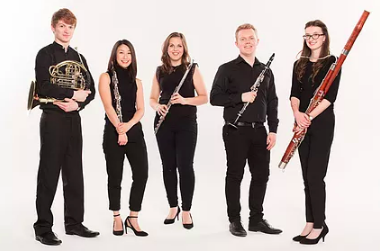The Magnard Ensemble and a cast of soloists perform Stephen Dodgson’s short chamber opera Cadilly alongside his Sonata for Wind Quintet at Conway Hall. Cadilly, based on one of the Tales from the Fens by W. H. Barrett, tells the story of a beautiful woman and ‘willing maid’ who is loved by the scholars, their tutors and the townsmen alike but jailed for ‘immoral behaviour’! A vibrant and comic piece.

Programme
Dodgson – Sonata
Gipps – The Lady of the Lambs
Vaughan Williams – Ten Blake Songs for Soprano and Oboe
Arnold – Three Shanties
Dodgson – Cadilly
Pre-concert talk – 5.30pm
Concert – 6.30pm
Tickets will be available via the Conway Hall website.
The Outcry Ensemble and English Voices perform Stephen Dodgson’s full-scale upper-voice Hymn Harmony at St John’s Smith Square alongside other works by Gibbons, Vaughan Williams and Coleridge-Taylor. The evening constitutes the final concert of their ‘Music for a Great City’ series, which explores the essence of a city as portrayed through its music, its history, its people and their perpetual sense of spirit through a rich variety of pieces.
Directed by James Henshaw and comprised of young, exceptionally skilled professionals poised to become the next generation of global orchestral leaders, The Outcry Ensemble brings together vibrant energy and captivating performances. Their repertoire programming strikes a balance between cherished classical works and new compositions commissioned from emerging composers.

Programme
The concert opens with Gibbons’ earthy Cries of London depicting the sometimes vividly raucous street vendors of his time. Next follows Vaughan Williams’ lyrical Serenade to Music, whose 16 soloists pay homage through Shakespeare’s text to the power and beauty of music. We continue to honour London composer Stephen Dodgson’s centenary with his Hymn to Harmony for upper-voice choir, which sets William Congreve’s text likewise celebrating music (‘The secret force of tuneful Sound’) and honouring its patron saint, Cecilia. The concert ends in a spirit of festivity captured by an under-celebrated British Black composer, Samuel Coleridge-Taylor, in his Feast of Hiawatha.
Orlando Gibbons – Cries of London
Ralph Vaughan Williams – Serenade to Music
Stephen Dodgson – Hymn to Harmony
Samuel Coleridge Taylor – Feast of Hiawatha
Tickets: https://www.sinfoniasmithsq.org.uk/book-online/10801/
The much admired wind group the Magnard Ensemble return to Luton with a programme particularly featuring Stephen Dodgson’s Promenade No.2.
Richard Sisson (Chair of Luton Music): ‘Stephen was for many years associated with Luton Music, generously giving his time to serve as a Vice-president. 2024 is the centenary of his birth and it is an honour to programme this fine piece in his memory.’

Programme
Sergei Rachmaninov (arr. McDermid) – Prelude in E flat Major Op 23 No.6
Martin Butler – Down-Hollow Winds
Stephen Dodgson – Promenade No.2
Wolfgang Amadeus Mozart (arr. Shiner) – Rondo in A minor K511
Samuel Barber – Summer Music
Ivor Gurney (arr. McDermid) – Nocturne in A flat Major
August Klughardt – Quintet in C major Op 79
Performers
Suzie Clements – flute
Mana Shibata – oboe
Joseph Shiner – clarinet
Catriona McDermid – bassoon
Jonathan Farey – French horn
Tickets
Tickets are available at the ticket desk on the night of a concert – cash, major credit cards or cheques with a bank card are accepted.
- Single Adult Tickets – £18
- Concessions – £10
- Under 18s in full-time education – Free




